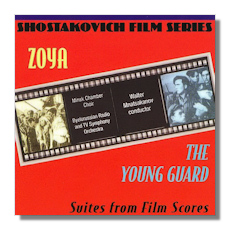
The Internet's Premier Classical Music Source
Related Links
- Shostakovich Reviews
- Latest Reviews
- More Reviews
-
By Composer
-
Collections
DVD & Blu-ray
Books
Concert Reviews
Articles/Interviews
Software
Audio
Search Amazon
Recommended Links
Site News
 CD Review
CD Review
Dmitri Shostakovich

Suites from Film Scores
- Zoya, Op. 64a * (1944)
- The Young Guard, Op. 75a (1947-48)
* Minsk Chamber Choir
Byelorussian Radio & TV Symphony Orchestra/Walter Mnatsakanov
Delos DRD2001
How do you like your film music? Bold, assertive, a critical partner to the action on the screen? Or deferential, in the background, unintrusive? Or somewhere in between? Shostakovich's film music is clearly in the first category. That said, the music here isn't bold in the sense of innovation or imagination. It is tuneful for the most part, free of any jarring dissonance, and very conservative in its expressive language: these 1940s scores, in fact, could well have been written around the turn-of-the-20th century. As for their emotional pitch, what we have here is happy Shostakovich, triumphant Shostakovich, sometimes bombastic Shostakovich, but definitely not angst-ridden Shostakovich, not Shostakovich with a hidden message. The writing is mostly two-part and sometimes only unison – and even the two-part music often sounds like unison writing. The brass is quite active throughout: try the giddy but catchy Scherzo (track 3) and The Song of the Young Guard Members (track 5), from The Young Guard; and, from Zoya, Victory (track 11).
These two scores were both arranged by Levon Atovmyan (his surname appears in the accompanying Delos material as Avtomyan, an erroneous spelling as far as I can determine from numerous sources). He arranged many Shostakovich film scores into suites, usually with the consent of the composer, and Atovmyan (or Atovmian) has generally done fine work in making this traditionally neglected music available for concert performance. The subject of both films is heroism of Soviet youth during the war, and though there are some dour moments in the scores (Death of the Heroes, #6, from The Young Guard, and Execution, #3 [track 10], from Zoya), for the most part the music mixes triumph and happiness. As I mentioned there are some nice tunes, but not anything particularly memorable. The sound reproduction from these 1995 recordings, originally released on Russian Disc, is excellent. The performances by the Byelorussian Radio and TV Symphony Orchestra and Minsk Chamber Choir are fully committed. A good measure of the credit for these positive results must go to veteran conductor Walter Mnatsakanov.
It's hard to evaluate music like this in terms of making a recommendation. The production values are excellent, including the informative notes, and the music, as film music goes, is quite compelling. Shostakovich enthusiasts will surely want it, but others seeking more profound or adventurous fare will likely find the music too tame and disingenuously optimistic. To paraphrase a popular cable news network, there's my report – you decide.
Copyright © 2010, Robert Cummings




















